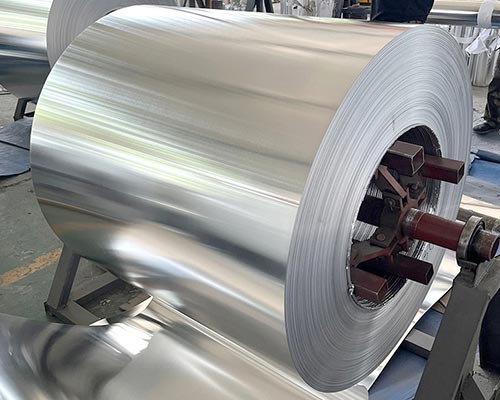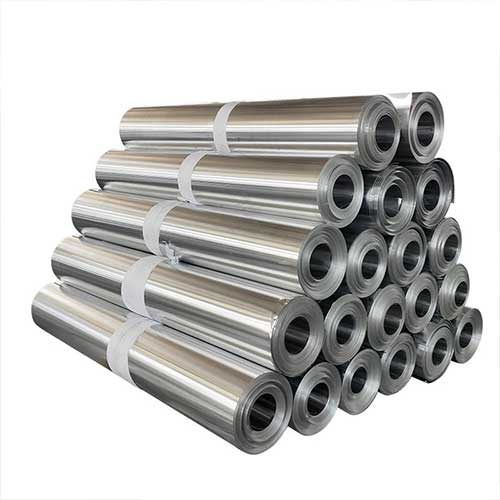مرحبًا بك في مدونتي!
قبل أن نتعمق في المحتوى، أود أن تنضموا إليّ على منصات التواصل الاجتماعي الخاصة بي حيث أشارك المزيد من الأفكار وأتفاعل مع المجتمع وأنشر التحديثات. إليك كيف يمكنك التواصل معي:
فيسبوك : فيسبوكhttps://www.facebook.com/profile.php?id=61565500692293
والآن، لنبدأ رحلتنا معًا. آمل أن تجدوا المحتوى هنا ثاقباً وجذاباً وقيّماً.
جدول المحتويات
مقدمة
لفائف الألومنيوم, a vital material used across various industries, is renowned for its lightweight and durability. However, one of its most critical characteristics is its corrosion resistance, which ensures that aluminum coils last longer and maintain their integrity even under challenging environmental conditions. As industries increasingly rely on aluminum coil for applications ranging from construction to automotive, it is essential to understand how corrosion affects its performance and what can be done to enhance its durability.
In this blog, we will explore the key factors that influence the corrosion resistance of aluminum coil, the benefits of using high-quality aluminum, and the various surface treatments and technologies that can further improve its resistance to corrosion. By understanding these factors, manufacturers and consumers can make informed decisions to maximize the lifespan of aluminum coil and ensure its optimal performance.

How Aluminum Coil’s Natural Corrosion Resistance Works
Aluminum, as a material, is inherently resistant to corrosion, thanks to the formation of a thin oxide layer on its surface when exposed to oxygen. This oxide layer acts as a protective shield, preventing further oxidation and damage. The natural corrosion resistance of aluminum is one of the key reasons why it is widely used in industries such as construction, transportation, and packaging.
However, the natural oxide layer can sometimes be vulnerable to environmental conditions, such as high humidity or exposure to aggressive chemicals. Therefore, it is essential to consider additional protective measures to enhance the material’s corrosion resistance.
Surface Treatments to Enhance Aluminum Coil’s Durability
Several surface treatments can improve the corrosion resistance of aluminum coil, making it even more durable in harsh environments. The most common techniques include anodizing, coating, and painting. Let’s explore these treatments in detail:
| معالجة السطح | الوصف | المزايا |
|---|---|---|
| Anodizing | Anodizing involves electrochemically increasing the thickness of the aluminum oxide layer. | Enhances corrosion resistance, increases hardness, and improves aesthetic appearance. |
| Coating | A protective coating is applied to the aluminum surface, which can be powder or liquid-based. | Provides a barrier to environmental factors and improves scratch resistance. |
| Painting | Painting involves applying a layer of paint to the aluminum surface. | Increases resistance to moisture, UV damage, and other corrosive elements. |
These treatments not only increase the durability of aluminum coil but also improve its aesthetic appeal, which is important in industries like architecture and automotive design.
How Aluminum Coil Performs in Harsh Environments
Aluminum coil’s corrosion resistance is especially valuable when it is exposed to harsh environments. For example, in coastal regions, the salt from seawater can accelerate the corrosion of materials. Aluminum’s resistance to saltwater corrosion makes it an ideal material for marine and coastal constructions, such as boat hulls, marine structures, and coastal buildings.
Similarly, in industrial settings where the aluminum coil may be exposed to chemicals or extreme weather conditions, surface treatments and the material’s natural corrosion resistance ensure that it remains functional and aesthetically appealing for a long time.
Improving Corrosion Resistance through Alloy Composition
The alloy composition of aluminum coils significantly impacts their corrosion resistance. For instance, aluminum alloys containing higher amounts of magnesium or silicon tend to have enhanced strength and resistance to corrosion. These alloys are often used in demanding applications, such as in the aerospace and automotive industries, where both strength and durability are required.
Here’s a quick look at the impact of alloy composition on corrosion resistance:
| نوع السبيكة | مقاومة التآكل | التطبيقات النموذجية |
|---|---|---|
| سلسلة 1000 | Excellent corrosion resistance due to high purity. | Food packaging, architectural panels. |
| سلسلة 5000 | High corrosion resistance, especially in saltwater. | Marine environments, offshore structures. |
| 7000 Series | Strong and resistant to corrosion in tough conditions. | Aerospace, automotive. |
By selecting the right alloy for specific environmental conditions, manufacturers can ensure the aluminum coil’s performance is optimized for its intended application.
Why Aluminum Coil’s Corrosion Resistance Matters in Construction
The construction industry is one of the largest consumers of aluminum coil, where its corrosion resistance plays a critical role. In building facades, roofing, and window frames, aluminum coil ensures long-lasting performance, requiring minimal maintenance even in challenging weather conditions.
By incorporating high-quality aluminum with enhanced corrosion resistance into construction projects, builders can reduce the frequency of repairs and replacements, making it an economically viable and sustainable choice.
The Role of Aluminum Coil in Sustainable Design
As sustainability becomes a significant focus in design and construction, aluminum coil’s durability and corrosion resistance make it an attractive option. Since aluminum is highly recyclable, using it in construction or automotive design contributes to reducing the overall environmental impact.
Additionally, aluminum’s lightweight nature means reduced energy consumption during transportation, further enhancing its eco-friendly credentials.
Corrosion Resistance in Automotive Applications: A Critical Advantage
In the automotive industry, aluminum coils are increasingly used due to their corrosion resistance and lightweight properties. The outer panels of vehicles, especially those exposed to the elements, require materials that can withstand environmental stressors like moisture, salt, and UV rays. Aluminum’s ability to resist corrosion in these situations is crucial for ensuring that vehicles maintain their structural integrity and appearance over time.
As automakers seek to reduce vehicle weight for fuel efficiency, aluminum coil continues to play a pivotal role in producing durable, long-lasting, and corrosion-resistant vehicle components.

The Future of Aluminum Coil Corrosion Resistance: Advancements and Trends
As industries evolve, the need for more advanced corrosion-resistant materials grows. Researchers and manufacturers are continually developing new alloys and surface treatments to enhance the corrosion resistance of aluminum coil. Innovations such as self-healing coatings and advanced anodizing techniques hold the potential to further extend the lifespan of aluminum products in a wider range of environments.
These advancements not only improve performance but also ensure that aluminum remains a sustainable and reliable material for future generations.
الخاتمة
In summary, corrosion resistance is a key factor in enhancing the durability and longevity of aluminum coils. Whether for construction, automotive, or marine applications, the right alloy and surface treatments can make all the difference.
At Liaocheng Jiuyang Steel Pipe, we pride ourselves on offering high-quality aluminum coils with exceptional corrosion resistance, ensuring long-lasting performance. Our commitment to quality and innovation makes us your trusted partner in providing reliable and durable aluminum solutions.
الأسئلة الشائعة
What is the best surface treatment for improving aluminum coil’s corrosion resistance?
The best treatment depends on the application, but anodizing and coating are two of the most effective methods for enhancing corrosion resistance, particularly in harsh environments.
How does aluminum coil perform in marine environments?
Aluminum coils perform exceptionally well in marine environments due to their natural resistance to saltwater corrosion, especially alloys like the 5000 series.
How can I improve the corrosion resistance of aluminum coil in industrial settings?
Using coatings or anodizing can significantly improve the corrosion resistance of aluminum coils, especially when exposed to chemicals or extreme conditions.
Does the alloy composition of aluminum affect its corrosion resistance?
Yes, aluminum alloys containing magnesium or silicon offer enhanced corrosion resistance, making them suitable for demanding applications like marine and aerospace.
Why is corrosion resistance important in the construction industry?
Corrosion-resistant aluminum coils reduce maintenance needs, increase the longevity of building materials, and provide better aesthetic appeal in construction projects.

